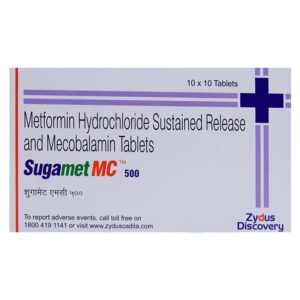METFORMIN + METHYLCOBALAMIN
Metformin: Metformin is a medication commonly prescribed to treat type 2 diabetes. It belongs to a class of drugs called biguanides. Metformin works by reducing the amount of glucose produced by the liver and improving the body’s response to insulin.
The primary use of Metformin is to help control blood sugar levels in people with type 2 diabetes. It is often prescribed in combination with diet and exercise. It can also be used in the treatment of polycystic ovary syndrome (PCOS) to help regulate menstrual cycles and improve fertility.
The dose of Metformin varies depending on the individual’s needs and response to the medication. It is usually taken orally, usually with meals. The typical starting dose for adults with diabetes is 500 mg or 850 mg once daily, and it can be gradually increased based on blood glucose levels. The maximum recommended daily dose is 2,000 mg.
As with any medication, Metformin may cause side effects. The most common side effects include gastrointestinal symptoms such as diarrhea, nausea, and abdominal discomfort. These side effects are usually mild and go away on their own after a few days or weeks. It is recommended to take Metformin with food to help reduce these side effects. In rare cases, Metformin can cause a serious condition called lactic acidosis, which is more common in individuals with kidney or liver problems. Symptoms of lactic acidosis include muscle pain, weakness, difficulty breathing, and irregular heartbeat. If any of these symptoms occur, it is important to seek medical attention immediately.
Overall, Metformin is a widely prescribed and well-tolerated medication that can effectively help manage blood sugar levels in people with type 2 diabetes. It is important to discuss any concerns or potential side effects with a healthcare professional before starting Metformin.
Methylcobalamin: Methylcobalamin is a form of vitamin B12 that is used to treat vitamin B12 deficiency. It is an essential nutrient that plays a crucial role in the formation of red blood cells and the maintenance of a healthy nervous system.
Methylcobalamin works by converting homocysteine to methionine, a vital amino acid involved in the synthesis of proteins and DNA. As a result, it helps in the production of red blood cells and supports nerve cell function.
The recommended dose of Methylcobalamin for adults is typically 1,000 mcg to 2,000 mcg per day. However, the specific dosage will vary depending on the individual’s age, medical condition, and the severity of the deficiency. It is available in various forms including oral tablets, sublingual tablets, and injections. Your healthcare provider will determine the appropriate dosage and form of administration for you.
Methylcobalamin is generally considered safe and well-tolerated when used as directed. However, like any medication, it may have potential side effects. Common side effects may include mild diarrhea, itching, rash, or redness at the injection site. These side effects are usually temporary and not serious. However, if you experience any severe or persistent side effects, you should seek medical attention.
It is important to note that Methylcobalamin should be used with caution in individuals with certain medical conditions such as Leber’s disease, kidney disease, or sensitivity to cobalt. It may also interact with certain medications, so it is essential to inform your healthcare provider about all the medications you are currently taking.
Overall, Methylcobalamin is an important form of vitamin B12 that is used to treat vitamin B12 deficiency and support the healthy functioning of the nervous system. It is generally safe when used as directed, but it is important to follow the recommended dosage and consult with your healthcare provider to ensure its appropriate use.

